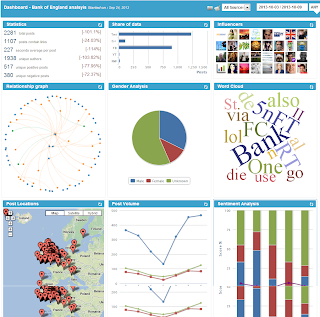You see, the PR industry is already at it. We are collecting information from newspapers (clippings) and processing them. Of course, we have done this for a very long time. Interpreting the news has been part of the PR job forever. But now, its not quite so civil and the Chartered Institute of Public Relations has to come to grips with the new environment.
 |
| Interpreting content |
Very gently, we are sliding into an area where ethics and best practice will collide.
The programme shown on the left is a nice representation of numbers of citations, pretty pictures of the community, some graphs and a word map.
Pretty innocent huh!
But hang on a minute. The pretty pictures are of people. Did they give anyone permission to have their photo in a business report?
Then there is the information about location. Who said I wanted to have my home address included?
So far pretty innocent. But now we come to the intelligence bit. I see that a number of people I know are associated with other people I know in the circle. Did these people really want to make it that obvious?

The graph on the right represents my contacts in LinkedIn. It shows clusters of people who are active in different spheres and I have highlighted one person who has links across a number of areas of my life. This graph is about me. LinkedIn do not allow you to create a network about, for example an organisation or several organisations. But... yes you guessed it, this is not hard to do. Within four hours I can have people from locations as far away as the Philippines and Bolivia who have all the software available to do it and they cost so little it's embarrassing.
Yes, again, did the actors in this graph realise that they could be used as pawns in such representation. Is it good?
This is only the first step. I have tested a number of companies to find out what proportion of employees have a LinkedIn profile. 88% is not unusual.
Using the same capability it is possible to build up a picture of the departments inside a company and compare that with other companies. We can identify the comparative levels of expertise between organisations. It is possible to find out the skills base of Basingstoke and Brighton, Birmingham and Bristol (OK, anywhere you like - even, if you are a lobbyist, Grangemouth and all of the major employers in the area).
But now lets have a look at a picture of the people who tweet about a company and especially those who re-tweeted a report published by the BBC's Robert Peston (the cluster near the middle).
They are now a PR target. A PR person would know that these people are opinion formers and will know the precise subjects that interest them.
That sounds cool huh! Is it ethical?
But what if these data was about a supermarket and drawn from tweets about the six competitors. Then the PR person can target the top most opinion formers, the really active customers or the people who continuously complain.
Does this mean that there is room here for some bullyboy tactics? Yes it does. Is that ethical. How is it to be managed?
But this is really not BigData analysis, this is SmallData analysis.
Imagine you wanted to finger the most potent political advisor's in the world? That would be big data and on issues like slavery, the environment, international trade and even war. Is it worth it?
It is absolutely possible to identify the build-up of skills being recruited and developed by organisations, industry sectors and much more. Is this how we can measure how the PR industry is gearing up to meet the demands of its client base? You see, this is a many sided debate.
So far, I have not mentioned photos and videos, location analysis or semantic inference capabilities (which Google uses all the time - but do you - can you?)
Neither the CIPR nor GCHQ are going to stop people putting stuff online and neither of them are going to stop people mining and manipulating this content and the data that is being extracted to gain political and commercial advantage.
The genie is out of the bottle.
What we have to do is know it is happening, create rules of engagement and certainly work towards an accord that will not disadvantage ethical practitioner or advantage those who would take advantage of the innocent.
I call on the CIPR to take a lead and at worst have a Commission to examine where it stands.
No comments:
Post a Comment